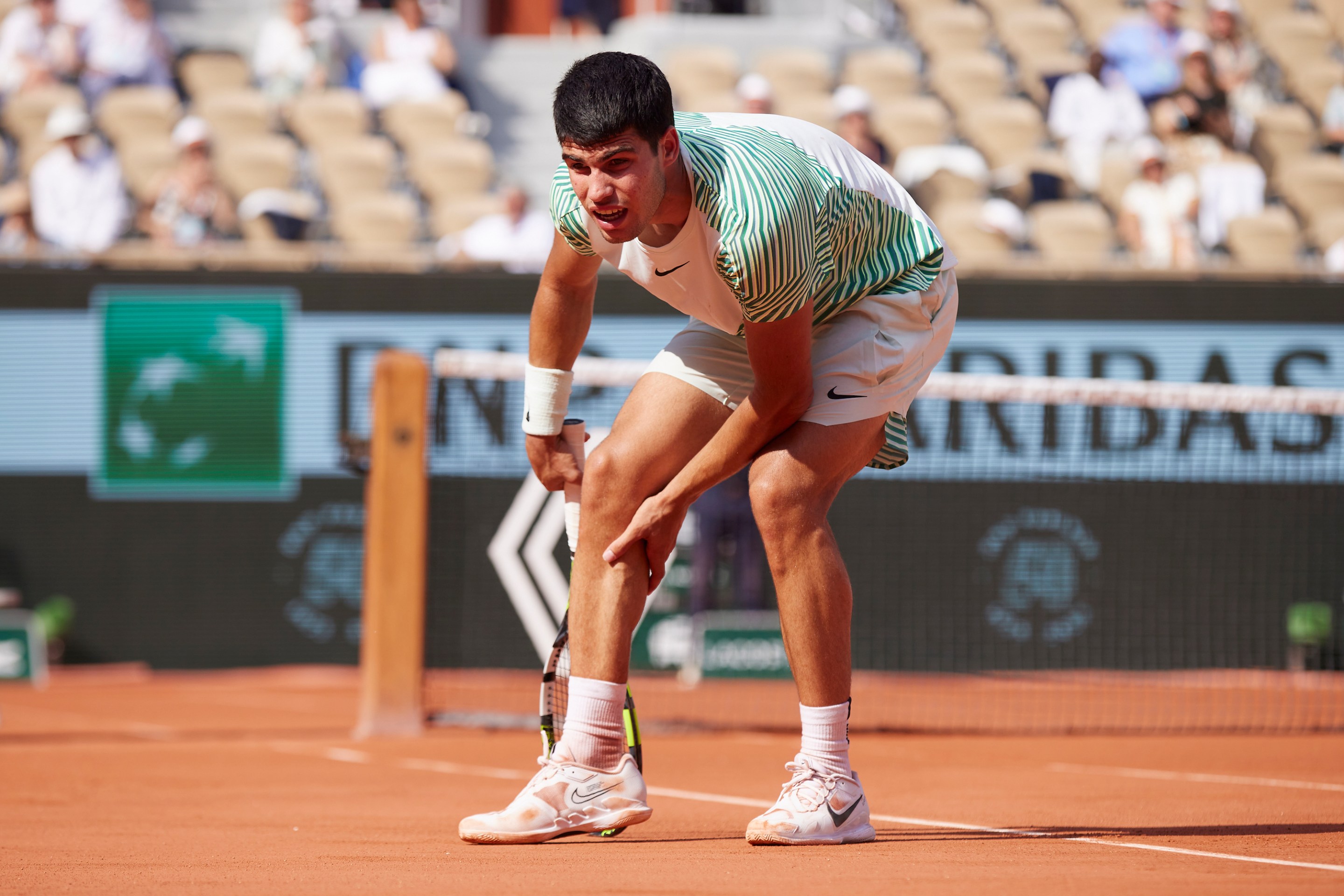Expectations were colossal for Friday's French Open semifinal between Carlos Alcaraz and Novak Djokovic: two all-time greats—or, more accurately, the all-time great and a 20-year-old alarmingly far along the path to becoming one—separated in age by 16 years, roughly as distant in game style, who have, due to injuries and exotic vaccine opinions, only appeared at the same tournament two times this season. Through two sets, those expectations were met. Djokovic and Alcaraz split the first two sets, and the match was shaping up like just another extraterrestrial classic, until, at 1-1 in the third set, Alcaraz was overcome by cramps. Per an obscure corner of the rulebook—I have never seen this happen before—Alcaraz then conceded a whole game to call on medical treatment before a changeover. Despite that scoreboard sacrifice, he never physically recovered. The remainder of the match was a grim formality, as a hobbled Alcaraz won just one more game and Djokovic snatched the last two sets of what should have been an epic, 6-3, 5-7, 6-1, 6-1.
It's worth reliving how spooky the tennis was getting before it crapped out. From the outset, Alcaraz was not quite his grinning, free-flowing, audacious self; there was tension legible in his game, in the unforced errors and uncharacteristic stiffness. Djokovic came out executing like a man with a vision and no time to spare. This isn't necessarily the norm these days. Late-career Djokovic can really take his time getting warmed up in some of these best-of-five matches, almost as if he masochistically enjoys spotting an inferior opponent a set or two, so the immediate aggression could be read as a compliment to Alcaraz. Against the world No. 1, Djokovic had no room for a "warmup" set. The 36-year-old dominated early exchanges with his forehand, generally the less appreciated of his two groundstrokes, and looked comfy operating outside of his usual baseline fortress style. The points were brief; Alcaraz was barking at his box about how he couldn't manage to get into a longer rally. Djokovic won these quick ones, won many of the hectic net exchanges that Alcaraz typically relishes, and took the first set persuasively.
The quality escalated in set two. While Djokovic had a clear plan for this match—constant pressure, even if it required him to play bigger than he likes—Alcaraz didn't always or even often play tactically sound tennis. To some extent, this is not his fault. It was only their second career meeting, and Djokovic's game is so eerily devoid of flaws that even an intuitive problem-solver like Alcaraz found nothing to latch onto. He made his fair share of bad decisions, but he also has the luxury of being 20 years old, and one of the most physically blessed athletes in the world, which lets him to paper over a bad shot selection with a flash of raw foot speed or an ingenious flick of the wrist. Case in point: the shot everyone will remember from this match. Carlitos was too fast to settle for the normie tweener, so he instead went for a squash-style dig, reminiscent of Federer.
In Novak voice: NOT TOO BAD 🤯#RolandGarros | @carlosalcaraz pic.twitter.com/pHkwxrff4u
— Roland-Garros (@rolandgarros) June 9, 2023
Alcaraz and Djokovic are both such superb movers, north-south and east-west, that watching this match was like reading a text stripped of punctuation marks. Where you'd expect a point to reach its natural conclusion, it would simply refuse, instead opening into a breathless pileup of shots and sprints and shots and sprints until one player remembered the possibility of error.
When players with both extreme offensive and defensive gifts match up, they abandon normal tennis and play what I like to call Wide Tennis. They stray into unexplored regions of the court. They attempt shots that would feel superfluous and idiotic if not for the identity of their opponent. Djokovic's level dipped late in the second set, and Alcaraz, after squandering a handful of set points on return at 4-5, broke serve at 5-6 to take the set.
It looked like these two would deliver a few more sets of similarly psychedelic tennis, until the cramps struck Alcaraz down. "I disappointed myself," Alcaraz said afterwards, "ending the match like this, coming into this match feeling great physically, and then cramping at the end of the second set, beginning of the third set." He said he felt them first in his arm, and eventually across his entire body, making it difficult to move. He attributed the cramps not to food or drink intake, but to the amount of tension he felt. "I started the match really nervous. The tension of the first set, second set, it was really intense. Really good rallies, tough rallies, drop shots, sprints, it was a combination of a lot of things," he said. "The main thing was the tension I had over the two first sets."
Asked if it the tension had anything to do with his opponent, he said it probably did: "If someone said that he's getting into a court with no nerves playing against Novak, he lies."
A depressingly long time ago, in some old blog, I wondered if we'd ever see a torch-passing moment in the men's game, defined as such: young player, at a major, beats Novak Djokovic while he's still at his best. Djokovic has generously held open the window for this hypothetical feat, having barely declined in ability at age 36, but the kids have still not found a way through. (I am not counting Daniil Medvedev's straight-set destruction of a crying, gassed Djokovic at the U.S. Open, because that wasn't Djokovic at his best.) Carlitos seemed like the best candidate yet, but he will have to wait until next time.






